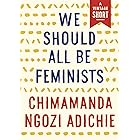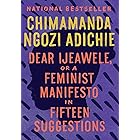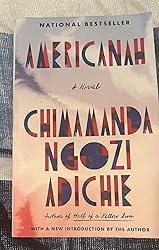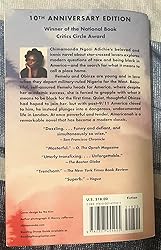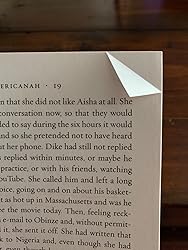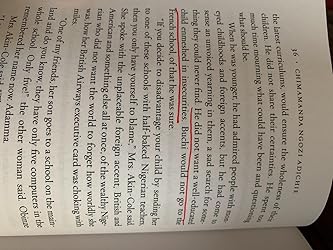| Kindle Price: | $12.99 |
| Sold by: | Random House LLC Price set by seller. |
Your Memberships & Subscriptions

Download the free Kindle app and start reading Kindle books instantly on your smartphone, tablet, or computer - no Kindle device required.
Read instantly on your browser with Kindle for Web.
Using your mobile phone camera - scan the code below and download the Kindle app.

OK
Image Unavailable
Color:
-

-
-
- To view this video download Flash Player
-

-
 VIDEO
VIDEO -

 Audible sample Sample
Audible sample Sample 


Americanah: A novel (Ala Notable Books for Adults) Kindle Edition
"An expansive, epic love story."—O, The Oprah Magazine
Ifemelu and Obinze are young and in love when they depart military-ruled Nigeria for the West. Beautiful, self-assured Ifemelu heads for America, where despite her academic success, she is forced to grapple with what it means to be Black for the first time. Quiet, thoughtful Obinze had hoped to join her, but with post–9/11 America closed to him, he instead plunges into a dangerous, undocumented life in London.
At once powerful and tender, Americanah is a remarkable novel that is "dazzling…funny and defiant, and simultaneously so wise." —San Francisco Chronicle
- LanguageEnglish
- PublisherVintage
- Publication dateMay 14, 2013
- File size5019 KB
Customers who bought this item also bought
 She rested her head against his and felt, for the first time, what she would often feel with him: a self-affection. He made her like herself. With him, she was at ease; her skin felt as though it was her right size.Highlighted by 7,185 Kindle readers
She rested her head against his and felt, for the first time, what she would often feel with him: a self-affection. He made her like herself. With him, she was at ease; her skin felt as though it was her right size.Highlighted by 7,185 Kindle readers She was taking two sides at once, to please everyone; she always chose peace over truth, was always eager to conform.Highlighted by 4,834 Kindle readers
She was taking two sides at once, to please everyone; she always chose peace over truth, was always eager to conform.Highlighted by 4,834 Kindle readers How easy it was to lie to strangers, to create with strangers the versions of our lives that we have imagined.Highlighted by 4,450 Kindle readers
How easy it was to lie to strangers, to create with strangers the versions of our lives that we have imagined.Highlighted by 4,450 Kindle readers
From the Publisher

|
|
|
|
|---|---|---|
|
|
|
|
Editorial Reviews
From Booklist
From Bookforum
Review
One of the Best Books of the Year:
The New York Times •NPR • Chicago Tribune • The Washington Post • The Seattle Times • Entertainment Weekly • Newsday • Goodreads
One of Time's 10 Best Fiction Books of the year
“Dazzling. . . . Funny and defiant, and simultaneously so wise. . . . Brilliant.” —San Francisco Chronicle
“A very funny, very warm and moving intergenerational epic that confirms Adichie’s virtuosity, boundless empathy and searing social acuity.” —Dave Eggers, author of A Hologram for the King
“Masterful. . . . An expansive, epic love story. . . . Pulls no punches with regard to race, class and the high-risk, heart-tearing struggle for belonging in a fractured world.” —O, The Oprah Magazine
“[A] knockout of a novel about immigration, American dreams, the power of first love, and the shifting meanings of skin color. . . . A marvel.” —NPR
“A cerebral and utterly transfixing epic. . . . Americanah is superlative at making clear just how isolating it can be to live far away from home. . . . Unforgettable.” —The Boston Globe
“Witheringly trenchant and hugely empathetic . . . a novel that holds the discomfiting realities of our times fearlessly before us. . . . A steady-handed dissection of the universal human experience.” —The New York Times Book Review
“Adichie is uniquely positioned to compare racial hierarchies in the United States to social striving in her native Nigeria. She does so in this new work with a ruthless honesty about the ugly and beautiful sides of both nations.” —The Washington Post
“Gorgeous. . . . A bright, bold book with unforgettable swagger that proves it sometimes takes a newcomer to show Americans to ourselves.” —The Dallas Morning News
“Americanah tackles the U.S. race complex with a directness and brio no U.S. writer of any color would risk.” —The Philadelphia Inquirer
“So smart about so many subjects that to call it a novel about being black in the 21st century doesn’t even begin to convey its luxurious heft and scope. . . . Capacious, absorbing and original.” —Jennifer Reese, NPR
“Superb . . . Americanah is that rare thing in contemporary literary fiction: a lush, big-hearted love story that also happens to be a piercingly funny social critique.” —Vogue
“A near-flawless novel.” —The Seattle Times
About the Author
Chimamanda Ngozi Adichie grew up in Nigeria. Her work has been translated into thirty languages and has appeared in various publications, including The New Yorker, The New York Times, Granta, The O. Henry Prize Stories, Financial Times, and Zoetrope: All-Story. She is the author of the novels Purple Hibiscus, which won the Commonwealth Writers’ Prize and the Hurston/Wright Legacy Award; Half of a Yellow Sun, which was the recipient of the Women’s Prize for Fiction “Winner of Winners” award; Americanah, which won the National Book Critics Circle Award; the story collection The Thing Around Your Neck; and the essays We Should All Be Feminists and Dear Ijeawele, or A Feminist Manifesto in Fifteen Suggestions, both national bestsellers. A recipient of a MacArthur Fellowship, she divides her time between the United States and Nigeria.
Excerpt. © Reprinted by permission. All rights reserved.
Princeton, in the summer, smelled of nothing, and although Ifemelu liked the tranquil greenness of the many trees, the clean streets and stately homes, the delicately overpriced shops, and the quiet, abiding air of earned grace, it was this, the lack of a smell, that most appealed to her, perhaps because the other American cities she knew well had all smelled distinctly. Philadelphia had the musty scent of history. New Haven smelled of neglect. Baltimore smelled of brine, and Brooklyn of sun-warmed garbage. But Princeton had no smell. She liked taking deep breaths here. She liked watching the locals who drove with pointed courtesy and parked their latest model cars outside the organic grocery store on Nassau Street or outside the sushi restaurants or outside the ice cream shop that had fifty different flavors including red pepper or outside the post office where effusive staff bounded out to greet them at the entrance. She liked the campus, grave with knowledge, the Gothic buildings with their vine-laced walls, and the way everything transformed, in the half-light of night, into a ghostly scene. She liked, most of all, that in this place of affluent ease, she could pretend to be someone else, someone specially admitted into a hallowed American club, someone adorned with certainty.
But she did not like that she had to go to Trenton to braid her hair. It was unreasonable to expect a braiding salon in Princeton—the few black locals she had seen were so light-skinned and lank-haired she could not imagine them wearing braids—and yet as she waited at Princeton Junction station for the train, on an afternoon ablaze with heat, she wondered why there was no place where she could braid her hair. The chocolate bar in her handbag had melted. A few other people were waiting on the platform, all of them white and lean, in short, flimsy clothes. The man standing closest to her was eating an ice cream cone; she had always found it a little irresponsible, the eating of ice cream cones by grown-up American men, especially the eating of ice cream cones by grown-up American men in public. He turned to her and said, “About time,” when the train finally creaked in, with the familiarity strangers adopt with each other after sharing in the disappointment of a public service. She smiled at him. The graying hair on the back of his head was swept forward, a comical arrangement to disguise his bald spot. He had to be an academic, but not in the humanities or he would be more self-conscious. A firm science like chemistry, maybe. Before, she would have said, “I know,” that peculiar American expression that professed agreement rather than knowledge, and then she would have started a conversation with him, to see if he would say something she could use in her blog. People were flattered to be asked about themselves and if she said nothing after they spoke, it made them say more. They were conditioned to fill silences. If they asked what she did, she would say vaguely, “I write a lifestyle blog,” because saying “I write an anonymous blog called Raceteenth or Various Observations About American Blacks (Those Formerly Known as Negroes) by a Non-American Black” would make them uncomfortable. She had said it, though, a few times. Once to a dreadlocked white man who sat next to her on the train, his hair like old twine ropes that ended in a blond fuzz, his tattered shirt worn with enough piety to convince her that he was a social warrior and might make a good guest blogger. “Race is totally overhyped these days, black people need to get over themselves, it’s all about class now, the haves and the have-nots,” he told her evenly, and she used it as the opening sentence of a post titled “Not All Dreadlocked White American Guys Are Down.” Then there was the man from Ohio, who was squeezed next to her on a flight. A middle manager, she was sure, from his boxy suit and contrast collar. He wanted to know what she meant by “lifestyle blog,” and she told him, expecting him to become reserved, or to end the conversation by saying something defensively bland like “The only race that matters is the human race.” But he said, “Ever write about adoption? Nobody wants black babies in this country, and I don’t mean biracial, I mean black. Even the black families don’t want them.”
He told her that he and his wife had adopted a black child and their neighbors looked at them as though they had chosen to become martyrs for a dubious cause. Her blog post about him, “Badly-Dressed White Middle Managers from Ohio Are Not Always What You Think,” had received the highest number of comments for that month. She still wondered if he had read it. She hoped so. Often, she would sit in cafés, or airports, or train stations, watching strangers, imagining their lives, and wondering which of them were likely to have read her blog. Now her ex-blog. She had written the final post only days ago, trailed by two hundred and seventy-four comments so far. All those readers, growing month by month, linking and cross-posting, knowing so much more than she did; they had always frightened and exhilarated her. SapphicDerrida, one of the most frequent posters, wrote: I’m a bit surprised by how personally I am taking this. Good luck as you pursue the unnamed “life change” but please come back to the blogosphere soon. You’ve used your irreverent, hectoring, funny and thought-provoking voice to create a space for real conversations about an important subject. Readers like SapphicDerrida, who reeled off statistics and used words like “reify” in their comments, made Ifemelu nervous, eager to be fresh and to impress, so that she began, over time, to feel like a vulture hacking into the carcasses of people’s stories for something she could use. Sometimes making fragile links to race. Sometimes not believing herself. The more she wrote, the less sure she became. Each post scraped off yet one more scale of self until she felt naked and false.
The ice-cream-eating man sat beside her on the train and, to discourage conversation, she stared fixedly at a brown stain near her feet, a spilled frozen Frappuccino, until they arrived at Trenton. The platform was crowded with black people, many of them fat, in short, flimsy clothes. It still startled her, what a difference a few minutes of train travel made. During her first year in America, when she took New Jersey Transit to Penn Station and then the subway to visit Aunty Uju in Flatlands, she was struck by how mostly slim white people got off at the stops in Manhattan and, as the train went further into Brooklyn, the people left were mostly black and fat. She had not thought of them as “fat,” though. She had thought of them as “big,” because one of the first things her friend Ginika told her was that “fat” in America was a bad word, heaving with moral judgment like “stupid” or “bastard,” and not a mere description like “short” or “tall.” So she had banished “fat” from her vocabulary. But “fat” came back to her last winter, after almost thirteen years, when a man in line behind her at the supermarket muttered, “Fat people don’t need to be eating that shit,” as she paid for her giant bag of Tostitos. She glanced at him, surprised, mildly offended, and thought it a perfect blog post, how this stranger had decided she was fat. She would file the post under the tag “race, gender and body size.” But back home, as she stood and faced the mirror’s truth, she realized that she had ignored, for too long, the new tightness of her clothes, the rubbing together of her inner thighs, the softer, rounder parts of her that shook when she moved. She was fat.
She said the word “fat” slowly, funneling it back and forward, and thought about all the other things she had learned not to say aloud in America. She was fat. She was not curvy or big-boned; she was fat, it was the only word that felt true. And she had ignored, too, the cement in her soul. Her blog was doing well, with thousands of unique visitors each month, and she was earning good speaking fees, and she had a fellowship at Princeton and a relationship with Blaine—“You are the absolute love of my life,” he’d written in her last birthday card—and yet there was cement in her soul. It had been there for a while, an early morning disease of fatigue, a bleakness and borderlessness. It brought with it amorphous longings, shapeless desires, brief imaginary glints of other lives she could be living, that over the months melded into a piercing homesickness. She scoured Nigerian websites, Nigerian profiles on Facebook, Nigerian blogs, and each click brought yet another story of a young person who had recently moved back home, clothed in American or British degrees, to start an investment company, a music production business, a fashion label, a magazine, a fast-food franchise. She looked at photographs of these men and women and felt the dull ache of loss, as though they had prised open her hand and taken something of hers. They were living her life. Nigeria became where she was supposed to be, the only place she could sink her roots in without the constant urge to tug them out and shake off the soil. And, of course, there was also Obinze. Her first love, her first lover, the only person with whom she had never felt the need to explain herself. He was now a husband and father, and they had not been in touch in years, yet she could not pretend that he was not a part of her homesickness, or that she did not often think of him, sifting through their past, looking for portents of what she could not name.
The rude stranger in the supermarket—who knew what problems he was wrestling with, haggard and thin-lipped as he was—had intended to offend her but had instead prodded her awake.
She began to plan and to dream, to apply for jobs in Lagos. She did not tell Blaine at first, because she wanted to finish her fellowship at Princeton, and then after her fellowship ended, she did not tell him because she wanted to give herself time to be sure. But as the weeks passed, she knew she would never be sure. So she told him that she was moving back home, and she added, “I have to,” knowing he would hear in her words the sound of an ending.
“Why?” Blaine asked, almost automatically, stunned by her announcement. There they were, in his living room in New Haven, awash in soft jazz and daylight, and she looked at him, her good, bewildered man, and felt the day take on a sad, epic quality. They had lived together for three years, three years free of crease, like a smoothly ironed sheet, until their only fight, months ago, when Blaine’s eyes froze with blame and he refused to speak to her. But they had survived that fight, mostly because of Barack Obama, bonding anew over their shared passion. On election night, before Blaine kissed her, his face wet with tears, he held her tightly as though Obama’s victory was also their personal victory. And now here she was telling him it was over.
“Why?” he asked. He taught ideas of nuance and complexity in his classes and yet he was asking her for a single reason, the cause. But she had not had a bold epiphany and there was no cause; it was simply that layer after layer of discontent had settled in her, and formed a mass that now propelled her. She did not tell him this, because it would hurt him to know she had felt that way for a while, that her relationship with him was like being content in a house but always sitting by the window and looking out.
“Take the plant,” he said to her, on the last day she saw him, when she was packing the clothes she kept in his apartment. He looked defeated, standing slump-shouldered in the kitchen. It was his houseplant, hopeful green leaves rising from three bamboo stems, and when she took it, a sudden crushing loneliness lanced through her and stayed with her for weeks. Sometimes, she still felt it. How was it possible to miss something you no longer wanted? Blaine needed what she was unable to give and she needed what he was unable to give, and she grieved this, the loss of what could have been.
Product details
- ASIN : B00A9ET4MC
- Publisher : Vintage (May 14, 2013)
- Publication date : May 14, 2013
- Language : English
- File size : 5019 KB
- Text-to-Speech : Enabled
- Screen Reader : Supported
- Enhanced typesetting : Enabled
- X-Ray : Enabled
- Word Wise : Enabled
- Sticky notes : On Kindle Scribe
- Print length : 610 pages
- Best Sellers Rank: #106,037 in Kindle Store (See Top 100 in Kindle Store)
- #86 in Black & African American Literary Fiction
- #89 in Australia & Oceania Literature
- #462 in Romance Literary Fiction
- Customer Reviews:
About the author

CHIMAMANDA NGOZI ADICHIE's work has appeared in numerous publications, including The New Yorker and Granta. She is the author of the novels Purple Hibiscus; Half of a Yellow Sun, which won the Orange Prize; Americanah, which won the NBCC Award and was a New York Times, Washington Post, Chicago Tribune, and Entertainment Weekly Best Book of the Year; the story collection The Thing Around Your Neck; and the essay We Should All Be Feminists. A recipient of a MacArthur Fellowship, she divides her time between the United States and Nigeria.
Customer reviews
Customer Reviews, including Product Star Ratings help customers to learn more about the product and decide whether it is the right product for them.
To calculate the overall star rating and percentage breakdown by star, we don’t use a simple average. Instead, our system considers things like how recent a review is and if the reviewer bought the item on Amazon. It also analyzed reviews to verify trustworthiness.
Learn more how customers reviews work on AmazonReviews with images
-
Top reviews
Top reviews from the United States
There was a problem filtering reviews right now. Please try again later.
The novel goes back and forth between the point of views of Ifemelu and Obinze. Through each narration, readers are drawn in by the travails of the character in focus. With Ifemelu, readers see how she sheds her innocence and is no longer naïve to how life in America is “supposed to be”. A quick example: when Ifemelu arrives in the U.S. to stay with her aunt Uju, she is surprised to see that she struggles to maintain a life for herself and her son. This aunt who once lived “large” in Nigeria, was now living in a roach- infested one bedroom apartment. The initial idea that the struggle was over when one arrived in the U.S..... Hmmm…not so much.
For Obinze, through the assistance of his mother, he was able to go to London, however, he learned that making money (especially as a foreigner) was not easy, and that since he was trying to obtain citizenship via the back way, he would struggle in almost anything he did. Life was not better in London compared to what he was accustomed to in Nigeria. Through the various jobs he took to survive and the relationships he attempted to make, there was always that feeling that he was losing a piece of himself. Definitely, not the life he imagined.
Without giving so much a way, I will say, this was a good book. This is a good book for those that are curious about immigrants, those who come over to seek a better way of life legally and those who enter a country illegally or through other means risking much, in search of what may be better. Due to the political climate we are experiencing now in the U.S., this is a book that should be on everyone’s reading list, if not, bookshelf. This book also tackles the social issues that our characters are faced with. If you have not addressed them personally, you will almost be forced to confront your own biases, whether you are white, black American or black and African.
I was drawn to each character in the novel- even those with minor roles for the reader, but significant to the main characters of the story. Adichie is so colorful with her words, she has the ability to transport you into the story and make you a front row spectator. Dry moments in the novel, barely. Once introductions are made at the beginning of the story and our characters determine where they are headed, the action begins and you are curious to see where the story will take you.
Would I recommend this book? With a resounding “YES”! How can I not? This book speaks to my heart. It took me two and a half weeks to read this book, but that was me with a million of other things and books on my plate. However, if this is the only book you are reading, it should be an easy and fast read.
It's like the word Americanah, such a Nigerian word, used to describe someone who had lived abroad for so long, they no longer understand the nuances of being Nigerian. They use American swearwords, or complain that the fries at KFC Onikan are limp, even though you see nothing wrong with them. This is when you turn to someone who understands and say, (No mind am, na Americanah), Don't mind him, he is an Americanah.
Adichie's latest follows Ifemelu, a bright, sharp and observant girl, from her early years in 1990's Nigeria, to a life in America, where after the first rude shocks of culture change in a new world, where `fat' is a bad word and not merely a statement of fact, where colour is such a big issue that it can rule people's lives, and where everything is different, she slowly and surely starts to become an Americanah.
In Americanah, ifemelu observes, and we are informed by her observations, she converses and we see her character, and she remembers, and in her memories we see a rich story that begins in Lagos, journeys through the cities of America, and gains a body that is beautiful to savour. It is through Ifemelu's observations, we experience what Americana is about.
Hair, specifically Black/African hair. Why do black women hide their hair? Would Beyonce ever allow the world to see her hair the way it really is, or would Michelle Obama? These are the questions Ifemelu asks In her blog, where after having lived in the United States for a long time, she broaches issues of race, hair and life in America from the eyes of a `Non-American Black'.
We experience race, Kimberley, the white woman who uses beautiful as a word to describe `black', because for whichever reason, black is a word that should be said as little as possible. Kurt, to whom Ifemelu's race means nothing, and Blaine, the Black American Yale professor, whose influence, in my opinion, would be the biggest in turning Ifemelu's observations from the disinterested and amused observation of a `Non-American Black' or `NAB', who calmly tells Kimberly, "You know, you can just say `black.' Not every black person is beautiful." to those of an `American Black' or `AB', who would say in her blog. "If the "slavery was so long ago" thing comes up, have your white friend say that lots of white folks are still inheriting money that their families made a hundred years ago. So if that legacy lives, why not the legacy of slavery?" The old Ifemelu would have told the descendants of the slaves to `get over it'.
We also experience love, Adichie herself describes Americanah as a love story, and this is true. There is love in almost every book, but in Americanah, it is not incidental, it is a central part of the story. Before America, and race and hair became issues, there was Obinze, the love of Ifemelu's teenage life. If Ifemelu, the daughter of a civil servant who lost his job because he would not bow to the excessive respect that Lagos Yoruba's employ and call his boss `Mummy', and uses English in such a way as to provide a hilarious sort of comic relief, is sharp and confident, then Obinze, the only son of a university professor, with his love for American books and his quiet belief in himself, is self assured and mature. They fall in love soon after they meet as secondary school students in Lagos, and when Ifemelu tells her aunt and friend, Uju, about him, saying she has met the love of her life, there is a hilarious moment when Aunt Uju advises her to "let him kiss and touch but not to let him put it inside."
While most of the story is seen though Ifemelu's eyes and memories, we also get to see some of Obinze, we follow him to London, where he lives as an illegal immigrant, after failing to find a job in Nigeria, or to fulfill his dream of going to America, (he later visits America, when he becomes rich, and isn't impressed, he lost interest when he realized that he could buy his way in.) He is arrested on the eve of his sham wedding, and repatriated. In all this Obinze never loses a certain `solidity', that he seems to effortlessly possess. In a democratic Nigeria, where a new middle class is rising, and the money that used to be the preserve of the top army generals starts to filter down, Obinze gets lucky in the way that only happens in Nigeria, where there really is too much money, and overnight he is a very rich man.
When Ifemelu starts to hunger for home, Obinze, with whom she has lost touch, is already a husband and father. "Meanwhile o, he has serious money now. See what you missed!" her friend, Ranyinudo tells her, on a call from Nigeria. (How Nigerian to say something like that!) The central question becomes, will they get back together? To some, this is a weakness of the story, the descent into the fantasy of a happily ever after for the heroine and hero, but it is not such a bad thing in itself, it makes enjoyable, and hopeful reading.
In summary, I loved the story. I loved the familiarity of it, Ifemelu's mother's ridiculous religiousness, her fathers ludicrous use of English, Aunty Uju, Ginika, Kayode, Emenike, who is perhaps one of the more interesting characters, as he strives to shed the life he was born with, to become what he wishes to be, and all the other different kinds of people that make up the rich tapestry that is Nigerian life.
Ifemelu is an interesting character, observant, watchful, sure of herself, even as a teenager, she is confident in a way I wouldn't have understood at that age. Obinze, knows himself in such a way that he doesn't need to follow any crowd, or have anybody validate him. However, I did feel that the ending was rather rushed, as if the author had other things to do, and was hastily putting the final scenes together.
The main grouse I had with the book was the fact that I saw some elements from Adichie's previous works. When Barrack Obama wins the election and her cousin Dike calls her to say that his president is black like him, I remember an interview long ago where Adichie says that her nephew had said the exact same thing after the elections. It make me feel cheated, this, the similarity of her relationship with Curt to the relationship of the characters in her short story, The Thing Around Your Neck; when Obinze describes his house in Enugu, and I see the house in Birdsong, the scene of another adulterous affair in another of her old short stories. How autobiographical is her work then? I ask myself. I begin to feel suspicious, perhaps all the characters are really her and the people she knows, perhaps Pat Peoples is really Matthew Quick, and Nick Hornby's characters are really just himself?
I noticed that apart from Dike, her little cousin, and Obinze, and perhaps Obinze's mother, Ifemelu does not seem very emotionally involved with the people that shape her life, sometimes she seems like a watcher, an observer, and not a character in the story. Also, because this novel is really many observations and opinions, sometimes it does feel contrived, like a character or event has been introduced, solely because they are a means to present an issue Adichie wants to discuss. Lastly, I did not find the blog interesting, unlike the prose of the novel, the writing is not fluid, or vey descriptive, and seems to jump from one issue to another, trying to cram many thoughts into one jumbled package. This may be because I am not an NAB, and those issues mean little to me, perhaps the AB's would read it differently.
Regardless, Americanah is a wonderful read, sometimes laugh out loud funny, sometimes sad, but always interesting.
Top reviews from other countries
With a story which expands over more than 30 years, the timeline does never become heavy or difficult to understand. The number of characters might be a bit difficult but also enriching to the general plot, up to the taste of the reader.
Recommended for readers of contemporary literature.
Ifemelu è una nigeriana emigrata negli Stati Uniti che vede i suoi connazionali cambiare identità, perdere la loro unicità per omologarsi agli americani, per farsi accettare da loro, anzi per essere a tutti gli effetti come loro, giungerà a fare cose di cui si pentirà ma sul finale la protagonista diventa artefice del suo destino e afferma la sua identità. Super consigliato





